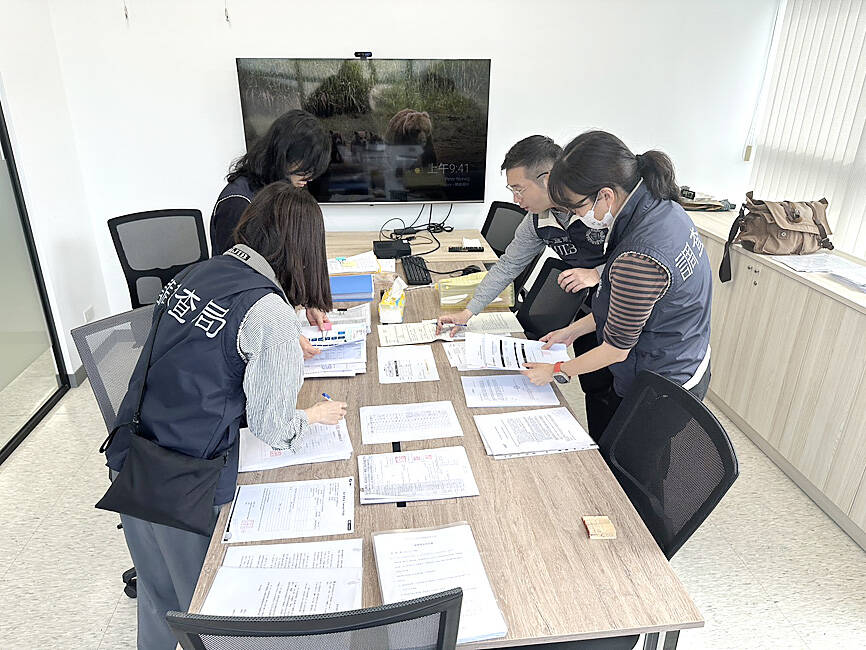The Ministry of Justice Investigation Bureau is investigating whether China’s leading chipmaker Semiconductor Manufacturing International Corp (SMIC, 中芯) illegally poached local engineers as part of an effort to access Taiwan’s cutting-edge chip technology.
SMIC set up a branch in Taiwan posing as a Samoa-based company and tried to hire local talent, prosecutors from the bureau said in a statement yesterday.
Local investigators this month raided 34 locations and questioned 90 people as part of a large-scale probe into 11 Chinese technology companies, including SMIC, the bureau said.

Photo courtesy of the Ministry of Justice Investigation Bureau
A SMIC representative did not respond to requests for comment.
SMIC rose to global fame in 2023 when it worked with Huawei Technologies Co (華為) to produce an advanced 7-nanometer chip despite facing a myriad of US-led curbs that continue to prevent Chinese companies from securing the most advanced chipmaking equipment.
However, the two companies have now hit a snag with technology development as they cannot secure ASML Holding NV’s extreme ultraviolet lithography systems required to make the most cutting-edge chips.
As China faces growing restrictions on its access to advanced foreign technologies, it has aggressively tried to obtain know-how in cutting-edge segments including semiconductors by ramping up efforts to recruit engineers from Taiwan and elsewhere.
Taiwan has become a favorite talent farm for China as the two sides share the same language, and Taiwan has the best chipmaking technologies in the world.
Taiwan Semiconductor Manufacturing Co (台積電) is the go-to chipmaker for Apple Inc and Nvidia Corp, producing the majority of the world’s artificial intelligence accelerators.
Taiwan does not allow Chinese companies to conduct business activities including hiring locally without formal government approval. However, there have been many cases of Chinese technology companies setting up operations in Taiwan and posing as foreign or local firms.
The bureau said it has opened more than 100 investigations into Chinese companies illegally hiring Taiwanese engineers since it formed a task force for such probes in 2020.

Seventy percent of middle and elementary schools now conduct English classes entirely in English, the Ministry of Education said, as it encourages schools nationwide to adopt this practice Minister of Education (MOE) Cheng Ying-yao (鄭英耀) is scheduled to present a report on the government’s bilingual education policy to the Legislative Yuan’s Education and Culture Committee today. The report would outline strategies aimed at expanding access to education, reducing regional disparities and improving talent cultivation. Implementation of bilingual education policies has varied across local governments, occasionally drawing public criticism. For example, some schools have required teachers of non-English subjects to pass English proficiency

‘FORM OF PROTEST’: The German Institute Taipei said it was ‘shocked’ to see Nazi symbolism used in connection with political aims as it condemned the incident Sung Chien-liang (宋建樑), who led efforts to recall Democratic Progressive Party (DPP) Legislator Lee Kun-cheng (李坤城), was released on bail of NT$80,000 yesterday amid an outcry over a Nazi armband he wore to questioning the night before. Sung arrived at the New Taipei City District Prosecutors’ Office for questioning in a recall petition forgery case on Tuesday night wearing a red armband bearing a swastika, carrying a copy of Adolf Hitler’s Mein Kampf and giving a Nazi salute. Sung left the building at 1:15am without the armband and apparently covering the book with a coat. This is a serious international scandal and Chinese

TRADE: The premier pledged safeguards on ‘Made in Taiwan’ labeling, anti-dumping measures and stricter export controls to strengthen its position in trade talks Products labeled “made in Taiwan” must be genuinely made in Taiwan, Premier Cho Jung-tai (卓榮泰) said yesterday, vowing to enforce strict safeguards against “origin laundering” and initiate anti-dumping investigations to prevent China dumping its products in Taiwan. Cho made the remarks in a discussion session with representatives from industries in Kaohsiung. In response to the US government’s recent announcement of “reciprocal” tariffs on its trading partners, President William Lai (賴清德) and Cho last week began a series of consultations with industry leaders nationwide to gather feedback and address concerns. Taiwanese and US officials held a videoconference on Friday evening to discuss the

PERSONAL DATA: The implicated KMT members allegedly compiled their petitions by copying names from party lists without the consent of the people concerned Judicial authorities searched six locations yesterday and questioned six people, including one elderly Chinese Nationalist Party (KMT) member and five KMT Youth League associates, about alleged signature forgery and fraud relating to their recall efforts against two Democratic Progressive Party (DPP) legislators. After launching a probe into alleged signature forgery and related fraud in the KMT’s recall effort, prosecutors received a number of complaints, including about one petition that had 1,748 signatures of voters whose family members said they had already passed away, and also voters who said they did not approve the use of their name, Taipei Deputy Chief Prosecutor